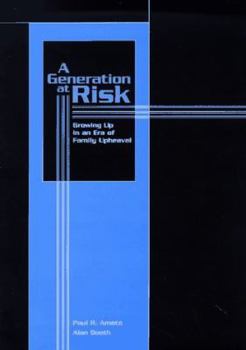A Generation at Risk: Growing Up in an Era of Family Upheaval
Select Format
Select Condition 
Book Overview
Just what do we know about the current generation of young Americans? So little it seems, that we have dubbed them Generation X. Coming of age in the 1980s and 90s, they hail from families in flux, from an intimate landscape changing faster and more profoundly than ever before. This book aims to give a clear, close-up picture of these young Americans and to show how they have been affected and formed by the tremendous domestic changes of the last...
Format:Hardcover
Language:English
ISBN:0674292839
ISBN13:9780674292833
Release Date:November 1997
Publisher:Harvard University Press
Length:319 Pages
Weight:1.35 lbs.
Dimensions:1.0" x 6.6" x 9.5"
Customer Reviews
2 ratings
A model sociological work
Published by Thriftbooks.com User , 22 years ago
A Generation at Risk holds appeal as compelling as its subtitle suggests - Growing up in an Era of Family Upheaval. Indeed, we have probably witnessed the most rapid change of family as an institution over the past decades throughout family history. Research is numerous and has addressed many aspects induced by "family upheaval" from macro- to micro-level. Amato and Booth's work has systematically mapped the cause-effect relationship between two generations: how each set of family-of-origin's characteristics (including parents' socioeconomic status, parents' gender nontraditionalism, parents' marital quality and divorce) affect offspring's well-being of various dimensions (including children's socioeconomic status, children's quality of intimate relationship, social integration and psychological well-being). They have done a remarkable job to answer the question we all have: whether changes in family life have harmed or benefited children, and to what extent.The great advantage of their research is to use longitudinal design to obtain information on independent variables from the parents over a period of 15 years as their offspring grew up and to obtain information on dependent variables from the offspring by the end of the study period. Therefore it avoids the inaccuracy due to retrospective errors and lowers the same-source bias. The longitudinal design especially remedies the point-in-time data provided by most surveys that are poor at measuring changes over time. It enables the researchers to analyze the data with life course theoretical framework. However, like all surveys in which every respondent is given the same set of questions, in-depth probe cannot be pursued. The authors have drawn lots of inference that possibly or probably links the independent and the dependent variables. For example, in explaining why unmarried children of non-traditional parents tend to leave home relatively early, it is assumed that their parents encourage residential independence yet such an assumption cannot be substantiated by the given data. Another drawback lies in the sampling bias that only married parents in 1980 were chosen and the non-traditional form of families were left out.Having said that, the data source for this research is extremely rich. Besides the standard information available such as parents' education and income, this study also has collected extensive information on the gender division of housework and childcare, gender attitudes, marriage quality, marital conflict, and divorce proneness. The measurement of offspring's well-being is also inclusive from the socioeconomic attainment to intimate relationship, from social integration to psychological well-being.
Very well Researched, good methodology
Published by Thriftbooks.com User , 24 years ago
This book is well researched and very objective. The researcher uses extensive data sources to offer support for the claim that money has only a secondary effect, and that parental involvment is a much more important factor for child sucess. In short, to improve society, we need better parents rather than more money.





